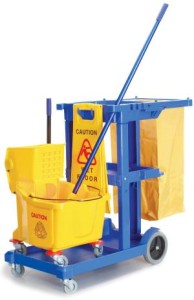 Over the years I have defended retailers and restaurants in many slip, trip and fall cases so I’ve seen people fall in everything you can image. I’ve also gone up against grapes and the infamous banana peel and am happy to say I was successful in defending such claims.
Over the years I have defended retailers and restaurants in many slip, trip and fall cases so I’ve seen people fall in everything you can image. I’ve also gone up against grapes and the infamous banana peel and am happy to say I was successful in defending such claims.
As a defense attorney, I’ve also seen many different techniques and procedures used by stores and restaurants to try and prevent civil liability. Some have worked and some have not. Based on my experience, I want to share some thoughts and opinions on store inspection policies and how they impact civil liability.
Store Inspection Policies Explained
Typically businesses have either formal or informal floor inspection policies, or a combination of both:
Formal Policies – The formal policies involve documentation to show the inspection was completed and can also include information such as who performed the inspection, when it was performed, what areas were inspected and if any cleaning was needed. These inspections are performed on regular time intervals throughout the day. Sometimes a cart is used during the inspection which allows for immediate clean-ups.
Informal Policies – Informal policies are generally a business training concept whereby employees are trained to continuously monitor the floors for hazards as they walk around the property. These are not documented and they are not performed on any type of schedule.
Combo Policies – The combo is when a business has a formal policy but it also trains its employees to always be vigilant and monitor the floors for hazards whenever walking around the property.
Of course there are still businesses that still do absolutely nothing at all, but that is becoming less and less the case as the courts make it more difficult for retailers, restaurants and hospitality companies to obtain summary judgment.
Impact On Civil Liability
I cannot speak for all states, but for cases in Illinois, I would recommend that retailers, restaurants and hospitality companies do the following to reduce employee/customer incidents and reduce civil liability:
- Use the combo approach to floor inspection policies;
- The written formal floor inspection policy should be short and concise and reviewed by defense counsel before implementation;
- Identify which employees will handle the floor inspection policies, provide training on how the inspection is to be performed and documented, document that training was completed and ensure that all new hires in that position are also trained;
- Develop a time interval in which the inspections are to take place, such as hourly, within each hour, etc.
- For areas that are known to have debris on the floor often (i.e. salad bar, buffet, produce dept.), have inspections more often, such as every 30 minutes compared to hourly;
- Have a form/chart for each property location to document when inspections are completed and by whom and keep it at a convenient location for everyone;
- Do not provide more information about inspections than is necessary – do not document what was found during the inspection or if cleaning took place;
- Have a system to remind employees to complete their regularly scheduled inspections;
- If the property is large, like a grocery store or department store, have a cart or bag for the employee to use during the inspection which would allow for quick clean-ups and quick access to a hazard sign;
- Include the informal procedures in the employee handbook as part of the overall initial training;
- The written informal procedure should be very short and concise, simply advising all employees to continuously monitor the property and its floors for any type of hazard and if one is seen, take care of it or call someone to take care of it.
If a customer incident takes place, be sure a copy of the formation inspection documentation form is made and kept with the incident report. Also, now that most properties have some form of surveillance systems, be sure to check not only if the incident is caught on tape but also look to see if the inspections were caught on tape. Surveillance footage can help prove that both informal and formal inspections took place, allowing for summary judgment.
I was involved in a case where the store failed to complete any formal inspections for the entire day and this was proven with the blank inspection form. However, the video surveillance showed an employee inspected the area as part of her duties shortly before the fall. The employee was looking to see if food needed to be stocked but she testified she always checked the floors as well. This testimony lead to summary judgment in my client’s favor, and the ruling was upheld on appeal. This is a great example of why the combo approach works best.
If you have any tips you can share on how to create a strong floor inspection policy, please share.
(Photo Shown: Powr-Flite Janitorial Sanitation Kit – http://www.powr-flite.com/product/jankit+-+janitorial+sanitation+kit.do)